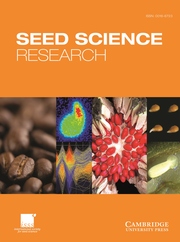Article contents
Degradation of endosperm mRNAs during dry afterripening of cereal grains
Published online by Cambridge University Press: 22 February 2007
Abstract
The endosperm of dormant wild oat (Avena fatua L.) grains contains a number of mRNAs, including low levels of transcripts encoding avenin (AV10), puroindoline-like (AV1) and serine proteinase inhibitor-like (Z1) proteins. During dry afterripening, a period of warm dry storage that relieves dormancy, the abundance of these intact transcripts gradually declined to undetectable levels in pooled grain samples. In contrast, the three mRNAs did not decline in grains stored for the same period at −20°C, and levels of mRNA decay products derived from these transcripts did not change during afterripening. Disappearance of the three intact mRNAs was not a general phenomenon, since abundance of more than 5000 other seed mRNAs did not change during this period. Additional experiments were conducted to test the idea that the presence of these transcripts was positively correlated with seed dormancy status. First, the rate of intact Z1 mRNA decline was similar to the rate of dormancy relief during 9 months of afterripening. Second, cultivated oat (A. sativa) grains (which are not dormant at maturity) contained much lower levels of these mRNAs than did highly dormant wild oat grains. Third, levels of full-length AV1 and Z1 mRNAs remained constant in dormant grains during 6 d of imbibition. However, Northern analyses of individual grains from a partially afterripened seed lot showed that amounts of intact AV1 or Z1 mRNAs were highly variable in germinating and dormant grains and were not correlated with dormancy status. Even though loss of these transcripts occurred under the same environmental conditions that promote afterripening, a causal relationship between the two processes seems unlikely. The apparently specific mechanism(s) by which these mRNAs are degraded in endosperm tissue may represent a novel post-transcriptional process for regulating levels of certain transcripts in dry grains.
- Type
- Research Article
- Information
- Copyright
- Copyright © Cambridge University Press 2000
References
- 12
- Cited by


